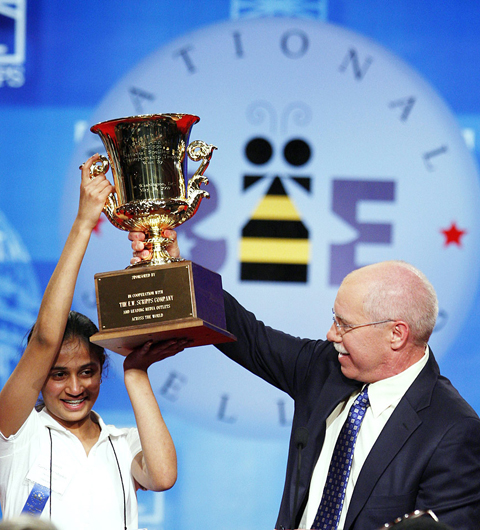Cool and collected, Kavya Shivashankar wrote out every word on her palm and always ended with a smile. The 13-year-old Kansas girl saved the biggest smile for last, when she rattled off the letters to “Laodicean” to become the latest in a line of Indian-American spelling champions.
The budding neurosurgeon from Olathe, Kansas, outlasted 11 finalists on Thursday night to win the Scripps National Spelling Bee, taking home more than US$40,000 in cash and prizes and, of course, the huge champion’s trophy.
Eight Indian-Americans have now won the title, including six of the past 10 winners.

PHOTO: REUTERS
“I can’t believe it happened,” Kavya said. “It feels kind of unreal.”
Kavya won in her fourth appearance at the bee, having finished 10th, eighth and fourth over the last three years.
She enjoys playing the violin, bicycling, swimming and learning Indian classical dance, and her role model is Nupur Lala, the 1999 Indian-American champion featured in the documentary Spellbound.
Last year, a final-round mishap by Sidharth Chand allowed Sameer Mishra to claim the title. Both also share an Indian heritage and aspire to be neurosurgeons.
The run of champions with South Asian roots began with Balu Natarajan of Chicago, who became the first Indian-American national bee champion in 1985.
After spelling the winning word, which means lukewarm or indifferent in religion or politics, Kavya got huge hugs from father Mirle, mother Sandy and little sister Vanya.
“The competitiveness is in her,” Mirle Shivashankar said. “But she doesn’t show that. She still has that smile. That’s her quality.”
Kavya turned 13 last week but was too busy planning for the bee to have a party.
“This is the moment we’ve been waiting for; it’s a dream come true,” Mirle said. “We haven’t skipped meals, we haven’t lost sleep, but we’ve skipped a lot of social time.”
She’ll have more time for such festivities now that she’s retiring as a speller, but she’ll eventually need another outlet for her competitive nature. Her father said she might enter the ‘Brain Bee,’ a science-oriented contest that should suit her career goal well.”
“But I don’t think anything can replace spelling,” Kavya said. “Spelling has been such a big part of my life.”
Second place went to 12-year-old Tim Ruiter of Centreville, Virginia, the only non-teenager in the finals. He misspelled “Maecenas,” which means a cultural benefactor.
Aishwarya Pastapur, 13, from Springfield, Illinois, who loved to pump her arm and exclaim “Yes!” after getting a word correct, finished third after flubbing “menhir,” a type of monolith.

POLITICAL PRISONERS VS DEPORTEES: Venezuela’s prosecutor’s office slammed the call by El Salvador’s leader, accusing him of crimes against humanity Salvadoran President Nayib Bukele on Sunday proposed carrying out a prisoner swap with Venezuela, suggesting he would exchange Venezuelan deportees from the US his government has kept imprisoned for what he called “political prisoners” in Venezuela. In a post on X, directed at Venezuelan President Nicolas Maduro, Bukele listed off a number of family members of high-level opposition figures in Venezuela, journalists and activists detained during the South American government’s electoral crackdown last year. “The only reason they are imprisoned is for having opposed you and your electoral fraud,” he wrote to Maduro. “However, I want to propose a humanitarian agreement that

ECONOMIC WORRIES: The ruling PAP faces voters amid concerns that the city-state faces the possibility of a recession and job losses amid Washington’s tariffs Singapore yesterday finalized contestants for its general election on Saturday next week, with the ruling People’s Action Party (PAP) fielding 32 new candidates in the biggest refresh of the party that has ruled the city-state since independence in 1965. The move follows a pledge by Singaporean Prime Minister Lawrence Wong (黃循財), who took office last year and assumed the PAP leadership, to “bring in new blood, new ideas and new energy” to steer the country of 6 million people. His latest shake-up beats that of predecessors Lee Hsien Loong (李顯龍) and Goh Chok Tong (吳作棟), who replaced 24 and 11 politicians respectively

Young women standing idly around a park in Tokyo’s west suggest that a giant statue of Godzilla is not the only attraction for a record number of foreign tourists. Their faces lit by the cold glow of their phones, the women lining Okubo Park are evidence that sex tourism has developed as a dark flipside to the bustling Kabukicho nightlife district. Increasing numbers of foreign men are flocking to the area after seeing videos on social media. One of the women said that the area near Kabukicho, where Godzilla rumbles and belches smoke atop a cinema, has become a “real

‘WATER WARFARE’: A Pakistani official called India’s suspension of a 65-year-old treaty on the sharing of waters from the Indus River ‘a cowardly, illegal move’ Pakistan yesterday canceled visas for Indian nationals, closed its airspace for all Indian-owned or operated airlines, and suspended all trade with India, including to and from any third country. The retaliatory measures follow India’s decision to suspend visas for Pakistani nationals in the aftermath of a deadly attack by shooters in Kashmir that killed 26 people, mostly tourists. The rare attack on civilians shocked and outraged India and prompted calls for action against their country’s archenemy, Pakistan. New Delhi did not publicly produce evidence connecting the attack to its neighbor, but said it had “cross-border” links to Pakistan. Pakistan denied any connection to